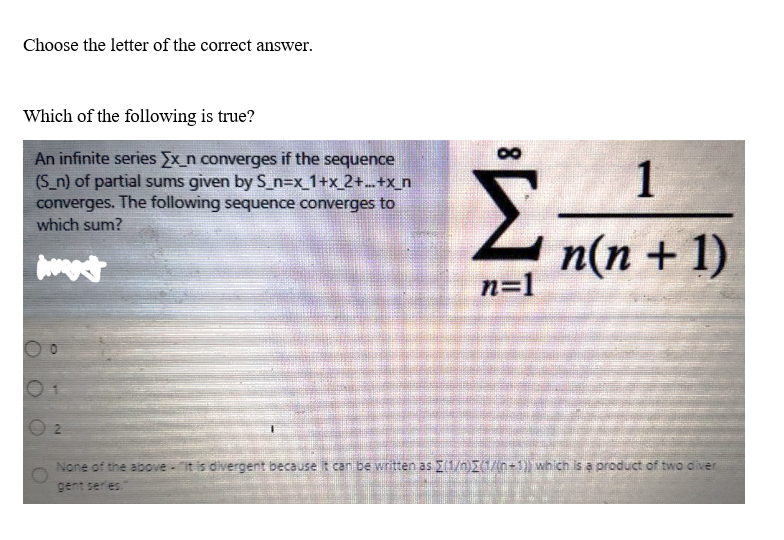An infinite series Ex_n converges if the sequence (S_n) of partial sums given by S_n=x_1+x_2+...+x_n converges. The following sequence converges to which sum? 01 02 Σ n=1 1 n(n + 1) None of the above it is divergent because it can be written as (1/n)(1/(n+1)) which is a product of two diver gent series
An infinite series Ex_n converges if the sequence (S_n) of partial sums given by S_n=x_1+x_2+...+x_n converges. The following sequence converges to which sum? 01 02 Σ n=1 1 n(n + 1) None of the above it is divergent because it can be written as (1/n)(1/(n+1)) which is a product of two diver gent series
Chapter9: Sequences, Probability And Counting Theory
Section9.4: Series And Their Notations
Problem 10TI: Determine whether the sum of the infinite series is defined. 24+(12)+6+(3)+
Related questions
Question
need fast

Transcribed Image Text:Choose the letter of the correct answer.
Which of the following is true?
An infinite series Ex_n converges if the sequence
(S_n) of partial sums given by S_n=x_1+x_2+...+x_n
converges. The following sequence converges to
which sum?
wagt
00
Σ.
2
n=1
1
n(n + 1)
None of the above it is divergent because it can be written as (1/n)(1/(n-1)) which is a product of two diver
gent series."
Expert Solution
This question has been solved!
Explore an expertly crafted, step-by-step solution for a thorough understanding of key concepts.
Step by step
Solved in 3 steps

Recommended textbooks for you


Algebra & Trigonometry with Analytic Geometry
Algebra
ISBN:
9781133382119
Author:
Swokowski
Publisher:
Cengage


Algebra & Trigonometry with Analytic Geometry
Algebra
ISBN:
9781133382119
Author:
Swokowski
Publisher:
Cengage